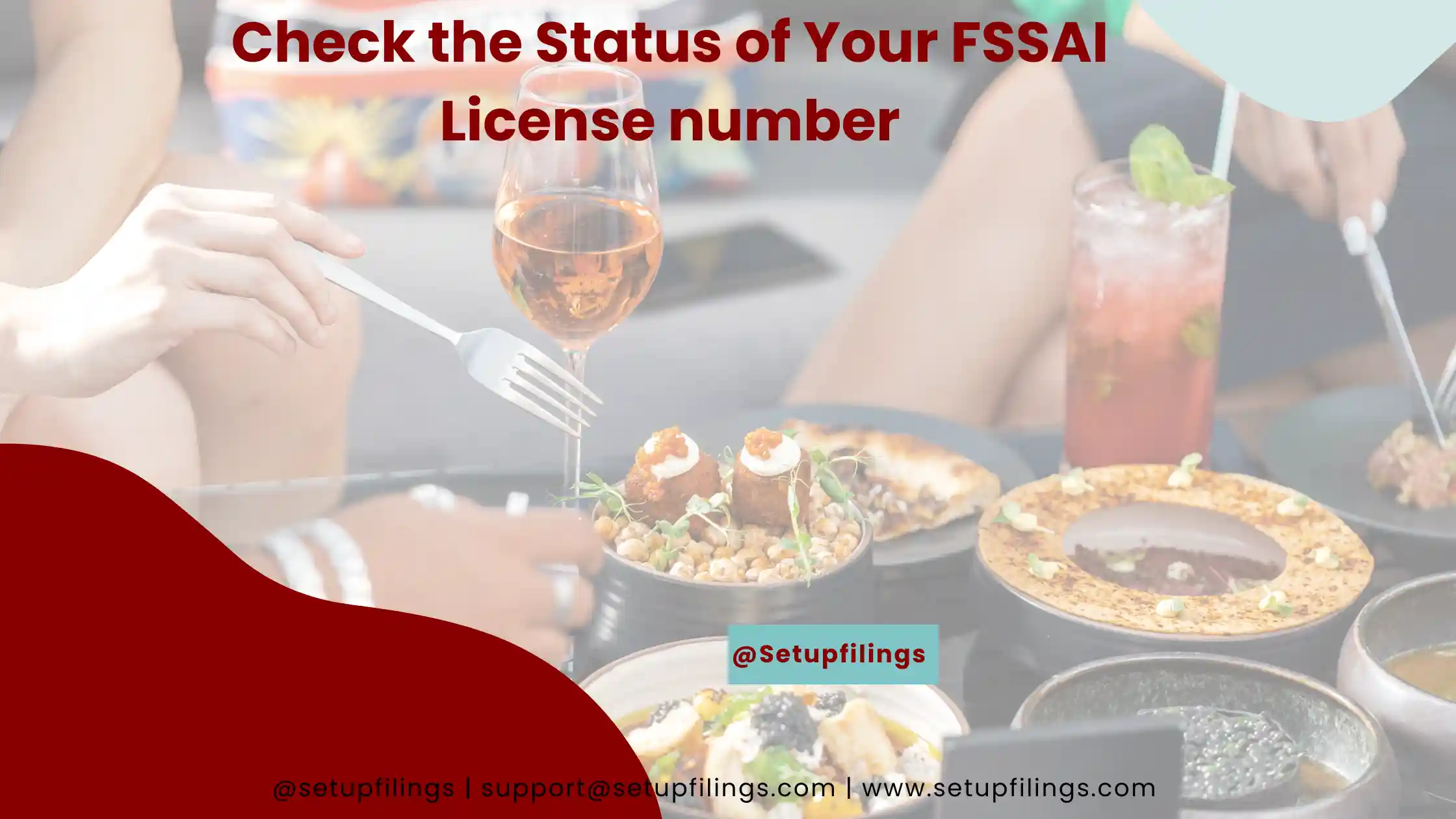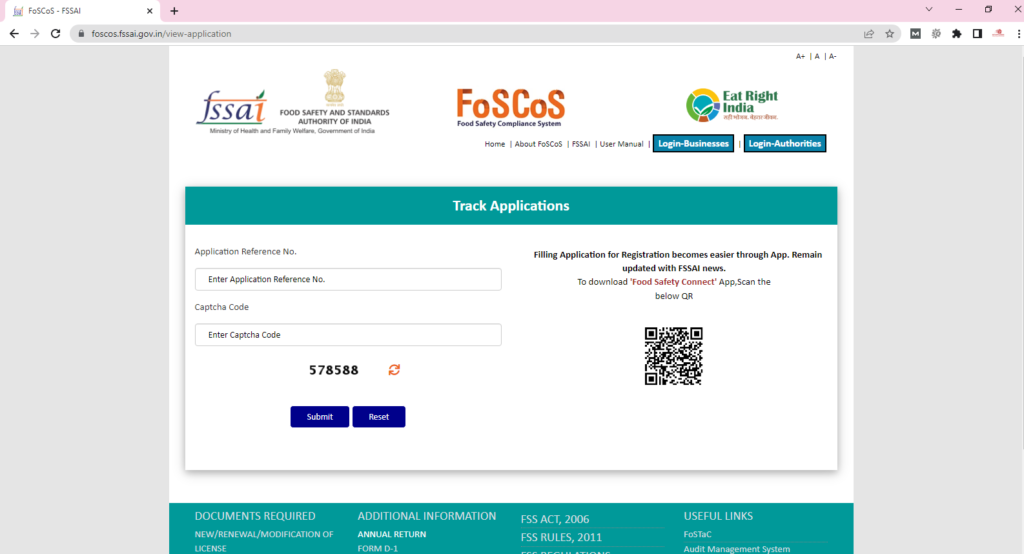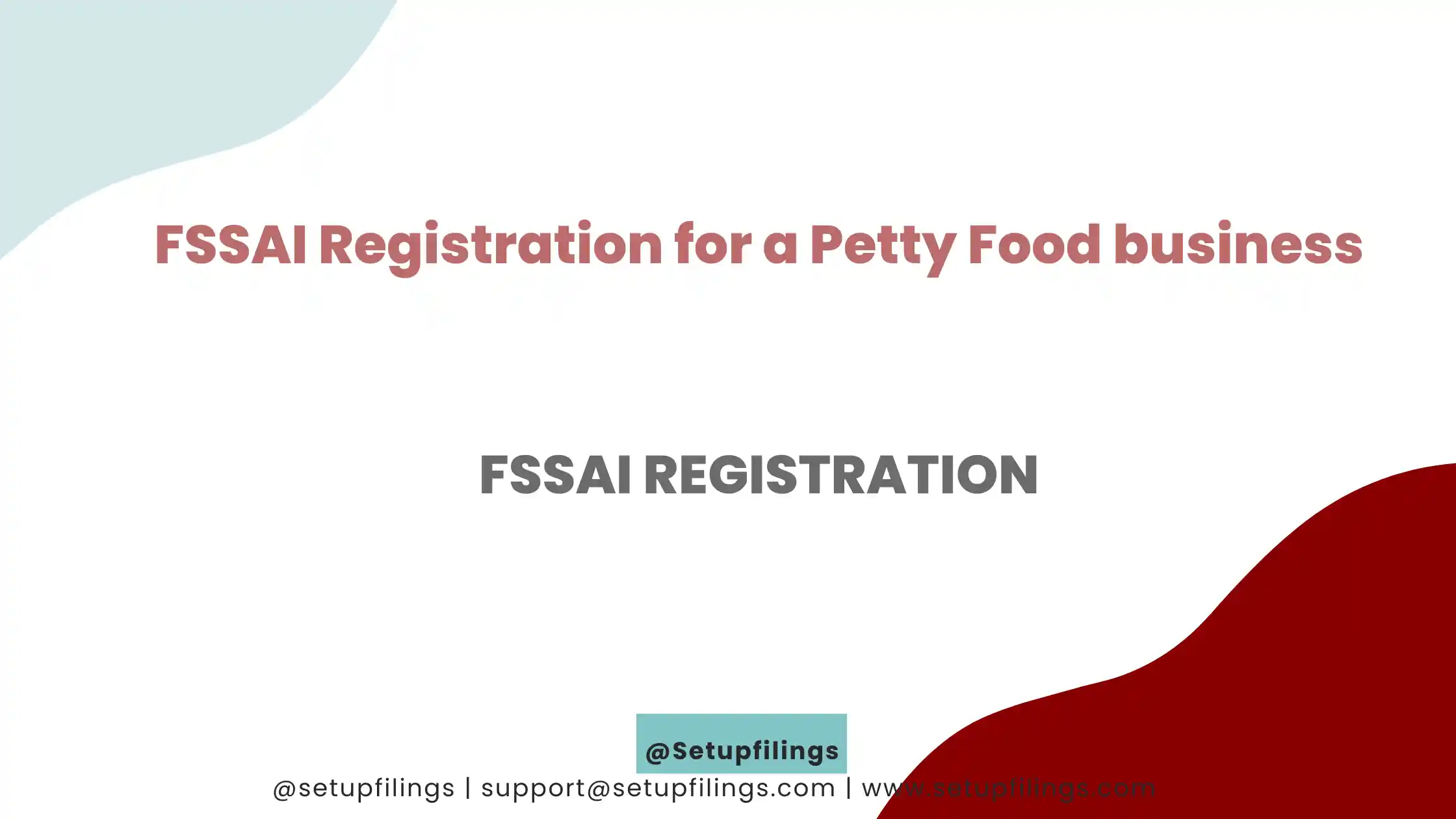
Check the Status of Your FSSAI License Number
Checking/tracking your FSSAI License Number online is a simple procedure. To check the status of your FSSAI license number, just follow a few easy steps. The only thing you’d need is the FSSAI License Number, which you received after successfully registering your FSSAI application.
Step 1. Visit to FoSCos/ FSSAI Official Website.

Step 1. Mention Your FSSAI Application Reference Number to Track your Status.

Step 2: Click the search button.
Step 3: Verify the details and validity of your FSSAI License Number.
The information includes:
• The status of your license (Active or Inactive);
• The name of your food business;
• The address of your food business;
• The kind of company; and
• The type of goods.
FSSAI License Number Guidelines
There are many phases of application that may be shown under the Status option. Let’s have a look at the various statuses in the FSSAI Application:
1. The 14-digit license number of the FBO must be printed on the food goods.
2. The font style coloring and colour of the FSSAI logo should contrast sufficiently with the background colour of the food product packaging to make the logo and license number visible.
3. Before the authorities may import the goods, they must provide the name and address, as well as the FSSAI number.
4. The proportion of letters, numerals, and alphabets should be calculated according to Food Safety and Standard Law.
5. The FSSAI emblem and license number are displayed on food goods to signify that the food business operator is licensed under the Food Safety and Standards Act.
6. All that remains is to print the FSSAI logo and license number on the product.
Renewal of FSSAI License
The FSSAI license is valid for one to five years, depending on the needs of the firm. If you do not renew your FSSAI registration on time, you will be fined Rs. 100 each day from the day it expires until it is renewed.
Food License Frequently Asked Questions
Q. 1 How can I get an FSSAI license?
Answer: The Food Safety and Standard Authority of India is the body in charge of issuing food licenses to food businesses in India. The FSSAI license registration process is as follows:
1. Go to the www.setupfilings.com website.
2. Fill up the blanks in the specified draught with relevant information.
3. Send your docs through email.
4. The papers will be checked, and any questions will be answered within two business days.
5. The applicant will get the paperwork within 7 business days.
Q. 2 How long does it take to get FSSAI certification?
Answer: There are three forms of FSSAI registration, and the period necessary for FSSAI license registration varies.
1. The basic FSSAI license will be issued within 7 business days.
2. State and central licenses will be issued within 30 days.
Q. 3 How much does an FSSAI license cost?
Answer: FSSAI licensing prices vary depending on the kind of FSSAI license.
1. FSSAI basic registration – Rs 999/-
2. FSSAI license from the state – Rs 15,000/-
3. FSSAI license from the central government – Rs 20,000/-
Please click here to see today’s deal.
Q. 4 What exactly is FoScoS? FSSAI?
Answer: FSSAI introduced the Food Safety Compliance System (FoSCoS) on June 1, 2020, to replace the previous Food Licensing and Registration System.
To operate a food product company, a Food License Registration certificate is necessary.
Q. 5 How can I check the progress of my FSSAI application?
Answer: Any food business in India must be FSSAI registered. You may reach out to our Expert at 7738877316 or Email us at support@setupfilings.com to learn more about your license.
Q. 6 How can I check the status of my FSSAI license renewal?
Answer: FSSAI license renewal may be done for one year or five years, and it is required for all food businesses in India. You may reach out to our Expert at 7738877316 or Email us at support@setupfilings.com to inquire about your FSSAI license renewal status.
Q. 7 What exactly is FSSAI?
Answer: On August 23, 2006, all food safety-related acts were merged under a single Food Safety and Standards Authority of India (FSSAI), which has ultimate jurisdiction over food manufacture, processing, packaging, transportation, and distribution.
It is now required to get a food license for anybody who works in a chain that involves food handling at any level. Everyone who operates a food company must get a license or register with the FSSAI. Whether an FBO needs a license or registration is determined by elements such as production capacity, the sort of food business operations handled, and the region of operation.
Q. 8 Why should you get an FSSAI license?
Answer: 1. Consumers have a high level of trust in the safety and quality of food.
2. It aids in the promotion of food product innovation.
3. It aids in the eradication of several rules.
4. It enables commerce while maintaining consumer safety and a greater market share.
Q. 9 What exactly is the FSSAI?
Answer: 1. Decentralization of food product licensing.
2. Simple and quick licence issuance with a one-month time period.
3. There is no need for a license for small FBOs; just registration is required.
4. This statute protects consumer safety and fair recompense to victims in the event of harm or death.
FSSAI guidelines
- The operator of a food business must be registered.
If a Food Business Operator operates in more than one state, an extra Central License for the Head Office is required.
Importers may get a single central license at their Import Export Code location.
- A single assumption with several kinds of enterprises is only eligible for one registration.
- Food Business Operators must follow the registration regulations and criteria.
Q. 10 What is the FSSAI registration procedure?
Answer: Three simple steps.
Consultation and documentation are the first steps.
Our FSSAI experts can assist you with the appropriate kind of registration, eligibility, and documentation.
- From one to two days.
Step 2: Application Submission and Approval.
You take a seat and focus on your work. We will carefully work on your application and will register you as soon as possible.
- From 3 to 4 days.
Step 3. DELIVERY OF LICENSE
The license is sent to your office in both digital and hard copy forms.
- From 5 to 7 days.
Q. 11 Do I need to apply for an FSSAI licence if I want to sell handcrafted items online on a modest scale?
Answer: Yes, you must obtain an FSSAI registration if your firm is tiny and your annual sales is between 0 and 12 lahks.
Q. 12 I’d want to renew my driver’s license. How does it work?
Answer: www.setupfilings.com can assist you with obtaining a new license as well as renewing an existing license. You just need to furnish us with your old license. It is possible to do so before the existing license expires in 30 days.
Q. 13 We have units in many states. Which license should I obtain?
Answer: A central Food Safety license is required.
Q. 14 What is FSSAI, 2006, and why is it necessary?
Answer: The Food Safety and Security Act of 2006 is an Act, and FSSAI was founded under it, that establishes scientific standards for food items and supervises their manufacture, storage, distribution, sales, and imports. Its major goal was to maintain a certain level of food quality and to reduce adulteration and inferior food quality.
Q. 15 Is FSSAI necessary for a unified food law?
Answer: Certainly, since the Act unifies multiple food legislation.
Q. 16 Who is in charge of implementing and enforcing the FSSA, 2006? Likewise, in India, who is the regulating authority under the Food Act?
Answer: The Food Safety and Standards Authority of India, in collaboration with state food authorities, is in charge of implementing and enforcing FSSAI, 2006.
Q. 16 What are the FSSAI’s priorities?
Answer: The FSSAI’s goals include establishing science-based standards for food items and regulating their manufacturing, storage, distribution, sale, and import to assure the availability of safe and healthy food for human consumption. Its major goal was to maintain a certain level of food quality and to reduce adulteration and inferior food quality.
Q. 17 What exactly does FSSAI do?
Answer: The FSSAI must perform the following:
(i) Establishing science-based standards for food goods;
(ii) Regulating food manufacturing, storage, distribution, sale, and import; and
(iii) Facilitating food safety.
Q. 18 Which food-related acts/orders are abolished by the FSSAI, in 2006? What are the main components of the law?
Answer: The Food Safety and Standards Act, 2006 will abolish the following Acts/Orders included in the Act’s second schedule:
1. Food Adulteration Prevention Act of 1954
2. Order Concerning Fruit Goods, 1955
3. Meat and Meat Products Order, 1973
4. Order Controlling Vegetable Oil Products, 1947
5. Order on the Packing of Edible Oils (Regulation), 1998
6. Control Order for Solvent Extracted Oil, De-oiled Meal, and Edible Flour, 1967
7. Milk and Related Goods Order, 1992
8. Any other regulation pertaining to food made under the Essential Commodities Act of 1955
Q. 19 How does this Act alter the way the PFA regulates food? What is the primary difference between the new Act and the PFA Act?
Answer: The following are the major transitions from PFA to FSSAI: PFA FSSAI Several Authorities Adulteration Safety Inspection / Regulation Monitoring by a Single Authority Surveillance Inadequate Enforcement Full-time district officer, FSC Food Safety Personnel officer
Q. 20 How does the FSSAI assist consumers?
Answer: Members of the Food Authorities and the Central Advisory Committee are consumer group representatives. As a result of the fear of legal action, there is virtually little probability of poor food quality among merchants who have a food safety license.
Consequently, having a food product in India
The FSSAI rule 2010 for food additives, which is published on the FSSAI website, outlines the limits for the use of certain FSSAI registration if your firm is tiny and your annual sales is between 0 and 12 lakh.
Q. 51 We have units in many states. Which form of FSSAI License should I get?
Answer: A Central FSSAI License is required.
Q. 52 Is FSSAI necessary for a unified food law?
Answer: Certainly, since the Act unifies multiple food legislation.
Q. 53 What is the registration cost for fssai?
Answer: www.setupfilings.com offers the greatest service at the most reasonable costs. The basic registration fee is Rs 3500/-, the state licensing fee is Rs 10000/-, and the central license fee is Rs 17000/-.
Q. 54 How can I look up my FSSAI license number online?
Answer: On the FSSAI website, you may verify your license number.
Q. 55 In India, who is the regulating authority under the Food Act?
Answer: The Food Safety and Standards Authority of India (FSSAI) is in charge of implementing and enforcing FSSA, 2006, with the assistance of state food authorities.
Q. 56 What exactly does FSSAI do?
Answer: The FSSAI must perform the following:
(i) Establishing science-based standards for food goods;
(ii) Regulating food manufacturing, storage, distribution, sale, and import; and
(iii) Facilitating food safety.
Visited 176 Times, 1 Visit today

